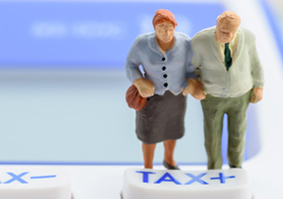Tax Privileges For Senior Citizens Under Existing Tax Regime
Published by Sharekhan Education | September 23, 2021

Tax Privileges For Senior Citizens Under Existing Tax Regime
“Welcome to the 60+ club Shenaz”, was the roar all around her. Shenaz, a freelance journalist had turned 60 last week. All her friends and family congratulated her on achieving this milestone in her life. Looking at her image in the mirror just before the party she was amazed that she had actually turned 60, though she did not look a day older than 50, she was a senior citizen now. She was happy and elated to become a senior citizen after all senior citizens had more privileges right?
The Government of India has endowed senior citizens with several special benefits like concessional rail and air fares, few seats reserved in public transports like trains and buses etc. Most importantly to lower the tax burden, the existing tax structure benefits senior citizens (means an individual resident in India who is of the age of sixty years or more at any time during the relevant previous year); with a few tax privileges as follows:
Privileges:
- Senior citizens enjoy a higher basic exemption limit than individual tax payers below the age of 60 years. The basic exemption limit for an individual below the age of 60 is Rs. 2.5 lakhs. While it is Rs.3 lakhs and Rs.5 lakhs for senior and very senior citizens (age 80 and above) respectively.
- The exemption on interest income earned from postal and or bank deposits of up to Rs. 50K under the existing tax regime is exempt for senior citizens u/s 80TTB. This privilege is not available for citizens below age 60.
- Senior citizens also enjoy Standard deduction on their pension income. However this deduction is available only for pensions earned from employers and not from annuity plans. The amount of deduction available is lower of Rs.50k or the amount of pension actually received.
- If a senior citizen has income from sources other than business then he/she need not to pay any advance tax on this income.
- Higher deduction u/s 80 D towards premium paid for health insurance of self and or parents. A citizen can get up to Rs.50k as deduction toward the mediclaim or health insurance premium they are paying for self and family which is higher than the deduction available to an individual below the age of 60. Also a point to note here is that if a senior citizen is paying health insurance premiums for his/her parents who are also senior citizens then he/she can claim an additional deduction of up to Rs.50k which can reduce their tax out go substantially.
- Another deduction available u/s 80D for senior citizens, who are not covered under any medical insurance, is a deduction up to Rs.50k towards their medical expenses. This is only if the senior citizen is not covered under any mediclaim / health insurance plan
- For senior citizens undergoing treatment for any specified diseases or critical illness section 80DDB of the Income Tax Act provides relief up to Rs.1 lakhs in a financial year. On the other hand for non-senior citizens this limit is just Rs.40k.
New Tax Regime:
In 2020, the government introduced a new tax structure, eliminating many deductions and exemptions for all citizens. It has introduced more tax slabs and rates to effectively reduce the tax payable. An important point to note here is that the existing tax structure co-exists with the new tax regime. Taxpayers can choose between old and new tax structures to minimize their tax payments.
However, opting for the new tax regime means senior citizens lose most tax privileges, impacting their tax savings. Choice to stay or exit from the current tax regime is entirely theirs. But it would be wise to weigh the pros and cons before doing so.
By enrolling in this stock market course, a learner can learn the basics and the various aspects of trading.




